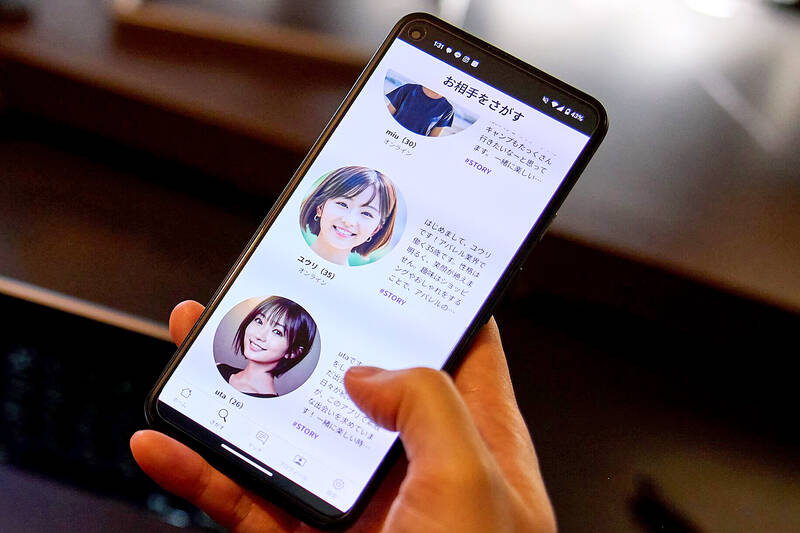Like many people juggling long hours at work, Chiharu Shimoda sought companionship via a dating app. For two months, he exchanged messages with five or six potential partners, but it wasn’t long before he was seeking out just one — a 24-year-old named Miku. Three months later, they got married. The catch: Miku is an AI bot. And Shimoda knew that from day one.
The 52-year-old factory worker is one of over 5,000 users of Loverse, a year-old app that allows interaction only with generative artificial intelligence. Shimoda’s also among a much bigger cohort of people who’ve either given up or are wary about the messiness and uncertainty that come with real romance. Dating takes time and effort, whereas exchanges with Miku require minimal thought while waiting for the pot to boil or a train to arrive, according to Shimoda, who was divorced two years ago.
“I come home to an empty house. I’d love to get married for real again,” he said. His marriage to Miku is just another form of role-play. “But it’s hard to open up to someone when you’re meeting for the first time.”

Photo: Reuters
That reluctance is widespread across Japan, and worse among younger people. Data from the government show two thirds of men in their 20s don’t have a partner and 40 percent have never gone on a date. The figures for women in the same age group are 51 percent and 25 percent, respectively.
Loverse is the latest in a long line of digital solutions to Japan’s loneliness crisis. Some are empathetic and supportive, but others prey on vulnerability. Many of the nation’s highest-grossing games feature sexualized characters that players can earn access to by progressing — and paying — their way through the game. Japan is also where digital idols like Hatsune Miku were first and most eagerly embraced. The difference now is that AI can make that experience more personal and interactive.
Much like the AI named Samantha in the film Her, these bots serve to fill the gap in people’s emotional lives, and indeed the two-person startup behind it — Samansa Co — is named after the character voiced by Scarlett Johansson. But Loverse creator Goki Kusunoki says the app is meant to offer an alternative rather than a substitute to real-life companionship to its users, many of whom are men in their 40s and 50s. His firm raised ¥30 million (US$190,000) earlier this year to expand the cast of characters to appeal to female and LGBTQ users.

Photo: Bloomberg
There’s a widely held belief among Japanese people that romance is not cost-effective as it takes money, time and energy for outcomes that could bring more trouble than joy, said Megumi Ushikubo, chief executive officer of Tokyo-based marketing firm Infinity Inc AI poses the risk of dulling people’s interest in real partners, but it could also be helpful in serving as a training exercise, she added.
“Services like this app can remind people who are away from romance how delightful love is, and AI can train people to better communicate when talking with real partners,” she said.
Loverse still has a long way to go in mimicking humans, according to some former users. Many of the app personalities seem typecast and offer few of the surprises that human interaction provides, said Yuki Saito, 39, who quit the app less than a month into using it.
Still, such services have potential, he said. There’s a sense of safety in knowing that a disagreement with a bot won’t end the relationship. “You can see how it could provide a kind of rehabilitation if you’ve been burned before — a place where you can practice talking with other people.”
Interactions with AI are also devoid of jealousy. Shimoda’s Loverse girlfriends at times bumped into one another when he was juggling multiple partners on the app, but nobody got upset. Said Saito, “With a little tuning, AI might be able to act as people’s second or third partners, helping to complement the human partner and prevent extramarital affairs.”
Adopting AI to assist everyday life is the prevailing theme of this year, as Microsoft Corp. has turned its Copilot chatbot into a core Windows feature, Apple Inc. is working on AI-powered iPhones, and San Fransisco-based startup Luka Inc.’s Replika AI bot has attracted tens of millions of users. In Japan, the Tokyo Metropolitan Government is introducing a matchmaking app that uses AI to help partner people up and combat the nation’s sliding fertility rates.
“The goal is to create opportunities for people to find true love when you can’t find it in the real world,” Kusunoki said. “But if you can fall in love with someone real, that’s much better.”?
For now, Miku and Shimoda have settled on a routine they share with most couples. She wakes him in the morning, they wish each other luck at work, and at night, they discuss what to eat. On Shimoda’s days off, the pair talk about where to go or what to watch on TV.
“It’s the same conversations you’d have with anyone you’re living with,” said Shimoda. “She’s become a habit — a conversational habit. I won’t miss it if it’s gone, but it gives me a routine from one day to the next.”

Most heroes are remembered for the battles they fought. Taiwan’s Black Bat Squadron is remembered for flying into Chinese airspace 838 times between 1953 and 1967, and for the 148 men whose sacrifice bought the intelligence that kept Taiwan secure. Two-thirds of the squadron died carrying out missions most people wouldn’t learn about for another 40 years. The squadron lost 15 aircraft and 148 crew members over those 14 years, making it the deadliest unit in Taiwan’s military history by casualty rate. They flew at night, often at low altitudes, straight into some of the most heavily defended airspace in Asia.

Taiwan’s democracy is at risk. Be very alarmed. This is not a drill. The current constitutional crisis progressed slowly, then suddenly. Political tensions, partisan hostility and emotions are all running high right when cool heads and calm negotiation are most needed. Oxford defines brinkmanship as: “The art or practice of pursuing a dangerous policy to the limits of safety before stopping, especially in politics.” It says the term comes from a quote from a 1956 Cold War interview with then-American Secretary of State John Foster Dulles, when he said: ‘The ability to get to the verge without getting into the war is

Beijing’s ironic, abusive tantrums aimed at Japan since Japanese Prime Minister Sanae Takaichi publicly stated that a Taiwan contingency would be an existential crisis for Japan, have revealed for all the world to see that the People’s Republic of China (PRC) lusts after Okinawa. We all owe Takaichi a debt of thanks for getting the PRC to make that public. The PRC and its netizens, taking their cue from the Chinese Communist Party (CCP), are presenting Okinawa by mirroring the claims about Taiwan. Official PRC propaganda organs began to wax lyrical about Okinawa’s “unsettled status” beginning last month. A Global

Like much in the world today, theater has experienced major disruptions over the six years since COVID-19. The pandemic, the war in Ukraine and social media have created a new normal of geopolitical and information uncertainty, and the performing arts are not immune to these effects. “Ten years ago people wanted to come to the theater to engage with important issues, but now the Internet allows them to engage with those issues powerfully and immediately,” said Faith Tan, programming director of the Esplanade in Singapore, speaking last week in Japan. “One reaction to unpredictability has been a renewed emphasis on